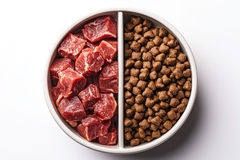High-carb kibble linked to adverse metabolic health in dogs compared to raw meat
Key takeaways
- A high-carbohydrate kibble diet led to increased blood sugar, blood lipids, and body weight in dogs.
- A raw meat-based diet promoted favorable metabolic responses, including decreased blood sugar and greater fat-burning.
- The findings suggest dogs could be useful models for studying human metabolic health, similar to controversial human studies on fat-rich diets.

A high-carbohydrate kibble diet has significantly different effects on dogs’ energy metabolism compared to a raw meat-based diet, according to new research. A recent study reveals that a kibble diet increased dogs’ long-term blood sugar, blood lipids, and body weight.
Dogs on the raw food diet, on the other hand, experienced decreased blood sugar, blood lipids, and glucagon levels.
The research was carried out by the DogRisk research group at the University of Helsinki, Finland.
“Interestingly, the kibble diet was associated with changes often linked to adverse metabolic health, while the raw food diet promoted metabolic responses generally considered favorable,” says Dr. Sarah Holm, PhD, the study’s lead researcher from the DogRisk research group at the Faculty of Veterinary Medicine at the University of Helsinki.
Dr. Anna Hielm-Björkman, DVM and docent, who leads the DogRisk group, adds: “Our findings reflect similar, and sometimes controversial, human studies suggesting that fat-rich diets actually lower cholesterol and triglycerides, while carbohydrate-rich diets raise blood lipids and long-term blood sugar — a known precursor to type 2 diabetes in humans.”
The authors believe their findings emphasize the potential of using dogs as models for human metabolic research. They add that this may pave the way for further investigations into how diet affects health across species.
Measuring ketosis in dogs
The trial observed 46 Staffordshire Bull Terriers who were fed either kibble or a raw food diet for an average of 4.5 months.
The kibble diet was rich in non-fiber carbohydrates, while the raw food diet was high in fat and contained no non-fiber carbohydrates.
Researchers measured various biomarkers before and after the trial, including blood sugar, insulin, cholesterol, triglycerides, ketone bodies, and body weight.
Among important findings, both groups had increased ketone bodies, but levels were significantly higher in the raw food group. This indicates that the dogs of this group developed a greater reliance on burning fat for energy.
The raw food group also showed a decrease in the triglyceride-glucose index, which is a marker of insulin resistance previously only used in human studies.
Growing focus on pet meal quality
In previous research, analysts flagged that “complete” plant-based dog foods may lack essential nutrients. When comparing six veterinary foods, 19 meat options, and six plant-based products, they found none were nutritionally “complete.”
At this year’s Vitafoods Europe trade show, the growing trend of pet “humanization” was reflected among featured launches, underscoring that consumers increasingly believe pets should be served food and supplements that are fit for human consumption.
Brands have responded accordingly by elevating formulas with innovative ingredient science. PawCo Foods recently introduced the Magic Cookie, a line of AI-designed functional dog biscuits designed to merge targeted health benefits with everyday treats.
Plentum also recently debuted its Advanced K9 Microbiome Care supplement, offering a gut-centric approach to canine wellness that combines scientific research and ingredient innovation to support dogs’ longevity and overall well-being.











